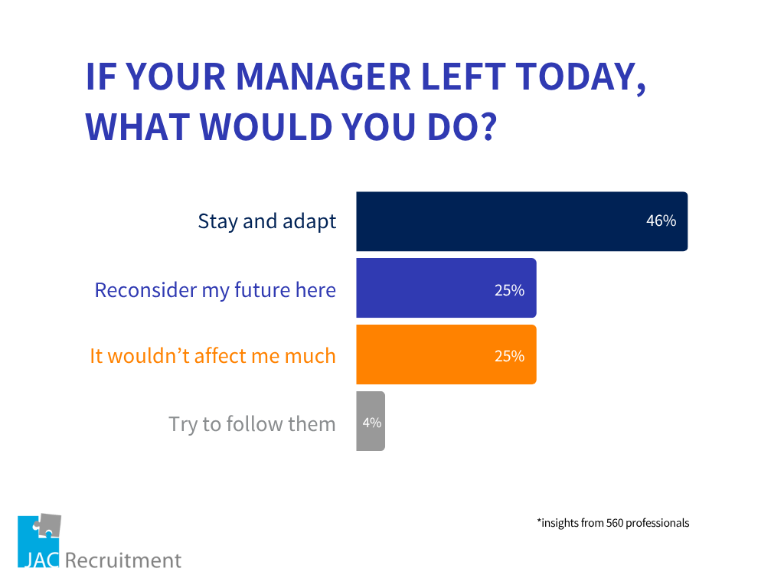It is a question that makes most people pause.
Not because there is a right or wrong answer, but because it taps into something deeper: what really keeps us in a job? Is it the people, the purpose, the growth, or something else entirely?
We asked this question to our online community. Over 550 professionals answered. Here is what they told us:

The results sparked more than just curiosity, they opened up a broader conversation about leadership, loyalty, and how people respond to change.
Not Just About the Manager
At first glance, nearly half of respondents choosing “stay and adapt” might suggest they do not rely on managers for their careers.But that is not quite the takeaway.
In reality, it tells us that many people anchor themselves in more than just their reporting line. The work they do, the culture they are part of, the path they are on, these things matter just as much, sometime more.
For leaders and employers, that could be a reassuring sign that retention does not always depend on any one individual.
But it is also a reminder that the broader environment you build matters. A lot.
A moment that makes people think
Now here is the interesting bit: when you combine those who would “stay and adapt” with those who would “reconsider”, you get 71%. That is seven in 10 people who would feel the shift, whether they stay or not.
It is not always about leaving. Sometimes, it is just the pause.
A trusted manager leaving can trigger questions like:
Do I still feel valued here?
Will the next leader understand me?
Is this still the right place for my growth?
For businesses, these transition points are make-or-break moments for trust and communication.
For professionals, it is a natural time to reflect, and that reflection can lead in any direction.
When it doesn’t make a difference
A quarter of people said their manager leaving would not really affect them. That could mean a few things.
Maybe they are in highly independent roles. Maybe they already have clarity and confidence in their career direction. Or … maybe they have quietly disengaged.
Either way, it is worth paying attention. Not reacting to change does not always mean everything is fine.
Few will follow
4% said they would try to follow their manager
We often hear stories of people moving with their leaders, but in reality, most people stay put. Career decisions today are layered. People weigh stability, personal growth, timing, and values. Loyalty still exists, but it’s rarely the only factor. And really, that is a good thing. It shows that career decisions today are more intentional, not just reactive.
That said, this number could easily shift depending on the influence and impact of the manager. A respected, empowering leader might have more people quietly considering a move with them. On the flip side, if the leadership style was disconnected or inconsistent, their exit might even be a relief.
It is not just about the role someone leaves, it is more about how they led, how they made people feel and what kind of gap they leave behind.
A Quiet Risk
If we look at it another way, by combining the 25% who would reconsider their future and the 4% who would try to follow their manager, that is 29% of employees who are at risk of leaving.
1 in 3 might leave. That is nearly a third of your team.
While not everyone who reflects will resign, these numbers suggest that leadership transitions can quickly become talent risk moments, especially if uncertainty is not managed proactively. It is a quiet kind of vulnerability: not everyone speaks up. But they do start weighing options.
The Bigger Picture
A manager’s exit does not just change reporting lines, it often triggers a wider trust checkpoint.
Employees start watching closely:
How is the departure handled?
Who communicates what, and when?
What kind of support or structure follows?
Even those who decide to stay may quietly re-evaluate whether their voice still matters, whether they will be supported moving forward, and how much faith they have in the organisation’s long-term direction.
Handled well, transitions can build confidence. Handled poorly, they can quietly fracture it.
Final Thought
If there is one thing this survey highlights, it is this.
Leadership changes do not just change reporting lines, they create ripple effects.
For some, they are moments to adapt and refocus, while for others they could spark quiet doubts. And for nearly 1 in 3, they could mark the beginning of a potential exit. But here is the key: it is not the change itself that drives decisions. It is how that change is handled, the communication, the clarity, and the culture that holds everything together. People do not just stay because of who they report to. They stay when they feel valued, supported, and confident in what comes next.
Leadership transitions are inevitable. But whether they fracture trust or strengthen it, that part is within our control.
Whether you are guiding a team through change or personally reflecting on what is next, we are here to help you navigate those moments with clarity.


